Saudi Arabia, EU Discuss Iran Nuclear Activities In Brussels

Saudi Arabia says its foreign minister has held talks with the EU foreign policy chief Josep Borrell about the Iranian nuclear program and talks for a new deal with Iran.

Saudi Arabia says its foreign minister has held talks with the EU foreign policy chief Josep Borrell about the Iranian nuclear program and talks for a new deal with Iran.
In a statement released Monday, Saudi Foreign Ministry said the Arab Kingdom’s Foreign Minister Faisal bin Farhan and Borrell exchanged views regarding Iran’s nuclear program and reviewed relations between Riyadh and the European Union.
“The two sides also discussed the latest regional and international developments and the efforts made to strengthen international peace and security,” added the statement.
However, the European Union in its statement did not mention the discussion of Iran’s issue during the talks between the two sides.
“Mr. Borrell, convened a meeting in Brussels with His Highness Prince Faisal bin Farhan, Foreign Minister of the Kingdom of Saudi Arabia, and Secretary-General of the League of Arab States, Mr. Aboul Gheit. They discussed the Middle East Peace Process, the increasing number of victims of violence, conflict and occupation, and the absence of a political perspective for a peaceful solution,” said the EU statement.
Earlier, the US Department of State announced a senior government delegation will travel to Saudi Arabia “to attend meetings which will focus on three priority sets: Integrated Air and Missile Defense and Maritime Security, Iran, and Counterterrorism.”
The US delegation will be led by Special Envoy for Iran Rob Malley, added the State Department.
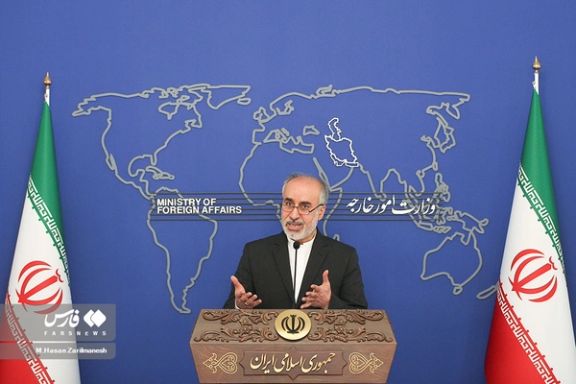
Iran’s Foreign Ministry says it will make the best use of Iraq’s relations with the United States for the resumption of talks to revive the 2015 nuclear deal.
During his weekly press conference on Monday, Foreign Ministry spokesman Nasser Kanaani referred to a meeting with Iraqi Foreign Minister Fuad Hussein and United States Special Envoy for Iran Robert Malley, and said Tehran uses all diplomatic capacities to realize the Islamic Republic’s national interests.
“Some governments have already played a role in this regard in good faith. Some governments are interested in using the capacity of their relations with both sides, and we will always welcome these joint efforts in good faith,” he added. “If the Iraqi government wants to play a role in this area, we take it seriously as the country is our friend, neighbor and brother, and we will use the capacities of the Iraqi government.”
Tehran, facing serious economic and political challenges insists that there is still a chance to restore the Joint Comprehensive Plan of Action, the JCPOA, while the US, which withdrew from the original deal under former US president Donald Trump, has repeatedly announced that it is no longer focused on the deal.
Iranian Foreign Minister Hossein Amir-Abdollahian held a phone call with his Iraqi counterpart on Friday, a day before the Iraqi foreign minister met with Malley. According to the official readout of the meeting by the Iraqi foreign ministry, Hussein and Malley discussed the Iran nuclear talks and the European's attitude toward suspending them. Malley praised Iraq's diplomatic role and the initiatives it launched to ease the tension in the region, the statement added.
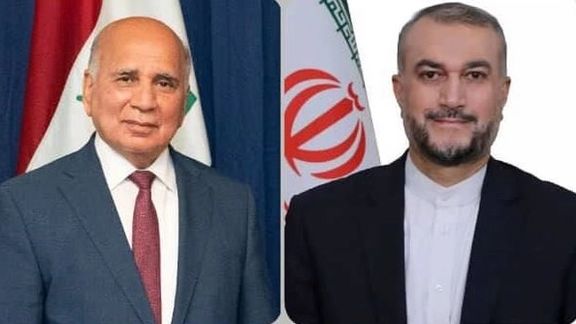
Since the current wave of antigovernment protests engulfed Iran in September, the Biden administration has announced that talks to revive the nuclear deal are not their priority anymore. Considering the international outcry over the Islamic Republic’s crackdown on dissent and human rights violations as well as the growing military ties between Tehran and Moscow, including from the US Congress, the prospects of saving the JCPOA is dimmer than ever.
Moreover, Kanaani expressed Iran’s readiness to exchange prisoners with the US in an “unconditional” manner without linking the swap to other issues, complaining that despite Iran’s goodwill, Washington has not taken an encouraging measure in this regard.
On Saturday, Hussein -- accompanied by Central Bank of Iraq Governor Ali al-Allaq -- met with Secretary of State Antony Blinken, Deputy Secretary of the Treasury Wally Adeyemo, and many other US officials and business leaders to discuss a host of economic issues. But an urgent issue was how to prevent Iran from using Iraq’s banking ties with the United States to launder US dollars and circumvent Washington’s sanctions.
In an interview with Al-Monitor in Washington on Sunday, Hussein said that "It’s no secret that I am in touch with both Iranian and American officials,” adding that “Both sides trust us, and that’s a good thing... It’s in Iraq’s interest that there be less tension between Washington and Tehran."
“I will continue these contacts,” said Hussein. “The US is an important ally, and Iran is an important neighbor, with whom we share many common interests, including a border, religion, culture, economics and trade. I hope both sides will start talking to each other again, but that’s their decision,” he added.
Elsewhere in his remarks, Kanaani touched on the issue of relations between Tehran and Riyadh, stressing the need for diplomacy to return the ties between Saudi Arabia and Iran back on track. Tehran welcomes any mediation by the Iraqi government and hopes that the efforts would improve relations between Saudi Arabia and Iran, he said.
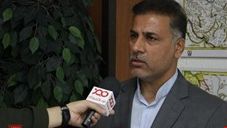
Iran claims its exports to Iraq are on the rise approaching $10 billion despite pressure by the United States on Baghdad to stop the IRGC’s money smuggling from the Arab country to Iran.
Abdol-Amir Rabihavi, the business adviser of the Islamic Republic in Iraq, told IRNA that Iran's exports to Iraq have been growing, and by the end of the current Iranian year in March, this figure will reach 10 billion dollars.
He said the US has decreased the supply of dollars to the Iraqi market which previously was at least $250 million per day. “The average supply of dollars, which is completely controlled by Washington, is now between 79 million and 84 million dollars per day, and in fact, the United States is responsible for the sharp decrease in the supply of dollars in Iraq,” he said.
In early February, Iran International obtained information that revealed some details about the inner workings of a Revolutionary Guard’s Quds force unit tasked with smuggling money from Iraq to Iran.
Iran is apparently facing a serious shortage of foreign currencies. Its currency, the rial, has fallen by 50 percent in the past years and now stands at a historic low of 460,000 rials to one US dollar.
In January, Iraq’s currency also fell substantially against the US dollar leading to reports that US banks had instituted tougher review of transactions originating from Iraqi banks, leading to a shortage of dollars in Iraq.
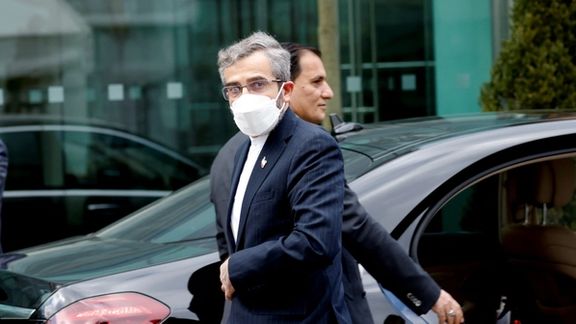
Iran’s chief nuclear negotiator, Ali Bagheri-Kani, says “negotiations in the framework of exchanging indirect messages between the two sides continue.”
The government’s official news website IRNA Sunday published an interview Bagheri had with Al Manar TV in Lebanon, where he tried to reassure the public that the chance to revive the 2015 nuclear agreement is not lost and talks are taking place.
The Islamic Republic faces multiple economic and political crises that have deepened in the past six months, as 18 months of indirect talks with the United States failed to produce a result and popular protests dealt a further blow to Tehran’s political standing.
The Biden Administration announced in October that its focus has shifted from the nuclear issue to supporting the rights of Iranian protesters and increasingly a negative mood emerged about the chances of any new talks.
“In the past year and a half when talks were taking place, the speed of negotiations might have increased and decreased at times but there was a continuity. Now also [talks] are taking place in the framework of exchanging messages between the two sides,” Bagheri said.
The Biden Administration has not explicitly denied exchange of messages with Tehran.
Iran International reported in January that the State Department did not deny information obtained by the network that US Iran Envoy Robert Malley had held meeting in New York with Tehran’s UN ambassador.
In response to questions submitted by Iran International on January 17, State Department spokesperson Ned Price said, “We have the means to deliver specific and firm messages to Iran when it is in America’s interest to do so.”
The contents of Malley’s meetings with the Iranians remain unclear, but the issue of Americans held hostage in Tehran or regional issues are all intertwined with the nuclear negotiations.
In early November, President Joe Biden told a citizen who asked him about the nuclear talks during an election campaign event that the “JCPOA is dead.” Bagheri commented about this and said that later US officials spoke about this – referring to comments that diplomacy will continue – and “in practice messages are being exchanged.”
Bagheri also did not deny that Qatar is playing a mediating role
There was little else new in what Iran’s chief negotiator had to say about the nuclear talks or the increasingly tense relations with the West. He repeated Supreme Leader Ali Khamenei’s accusation that the West instigated the protests in Iran.
He also reiterated that Iran’s most important “red line is the issue of guarantees”, that in case of a deal “the other party discharges its commitments.” Throughout the talks Tehran has been insisting on receiving guarantees from the United States that it will not pull out of an agreement, similar to President Donald Trump’s decision in 2018. Tehran is also insisting that it should receive the economic benefits once sanctions are lifted.
The US has said that it cannot guarantee an accord, which is not a treaty, beyond the term of the current administration.
However, on the issue of sanctions, Bagheri appeared to demand that only economic sanctions imposed by the Trump administration, not mentioning many new sanctions imposed by the current administration on companies and individuals.
Facing a worsening economic crisis and a popular revolt, Tehran wants to exhibit an aura of normalcy and hope. The target of positive statements about the chances of talks with the West is more the domestic audience that fast is losing hope in the future.
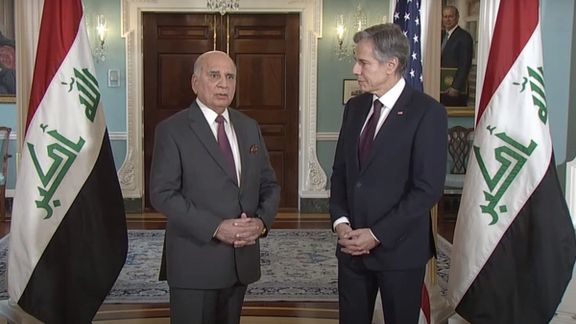
US officials have discussed banking and money laundering issues related to Iran with a high-ranking Iraqi delegation that visited Washington this week.
Deputy Prime Minister and Foreign Minister of Iraq, Fuad Hussein accompanied by Central Bank Of Iraq Governor Ali al-Allaq met with both the State Department and with Treasury to discuss a host of economic issues. But an urgent issue was how to prevent Iran from using Iraq’s banking ties with the United States to launder US dollars and circumvent Washington’s sanctions.
The outcome of the talks on this specific issue are not clear yet, but a statement from the US Department of the Treasury made it clear that the problem was among the main topics discussed.
The Treasury said that the two sides discussed the Iraqi “government’s plans for economic and financial sector reforms and a mutual commitment to anti-money laundering and countering the financing of terrorism (AML/CFT) measures.”
In January, Iraq’s currency fell substantially against the US dollar leading to reports that US banks had instituted tougher review of transactions originating from Iraqi banks, leading to a shortage of dollars in Iraq.
The Associated Press reported that the move was triggered a couple of months before to stamp out what Iraqi officials describe as rampant money laundering that benefits Tehran and Damascus which are under US sanctions.
According to information received by Iran International in early February, Iran’s Revolutionary Guard and the Islamic Republic’s embassy in Iraq are involved in the money laundering operations that aim to funnel the regime’s revenues from oil and gas exports back to Iran. As per a repeatedly extended sanctions’ waiver by Washington, Tehran is only allowed to import medicine and some essential goods in exchange for its exports of gas and electricity to its neighboring country.
According to a report by London-based newspaper Asharq Al-Awsat, the decline in the value of Iraq’s dinar and the accompanying price increases for foodstuffs and imported goods can be traced back to a remarkable change in the policy adopted by the US Treasury and the Federal Reserve Bank of New York.
To what extent these issue were resolved during the Iraqi delegation’s visit to Washington is not clear, but banking reforms were mentioned in statements and that shows this was a key topic in the discussions.
Iran is apparently facing a serious shortage of foreign currencies. Its currency, the rial, has fallen by 50 percent in the past years and now stands at a historic low of 500,000 rials to one US dollar.
Despite tougher implementation of US banking regulations by the Treasury, the tone of US officials was extremely deferential and respectful of the Iraqi government. State Department Spokesperson Ned Price during his briefing on February 9 described bilateral relations as one of close partners.
“Our relationship with the Government of Iraq is one based on partnership. It is one based on mutual respect. It is based on our mutual interests and what works to the benefit of both of our countries. It is not our approach…to issue demands, to issue decrees. When we engage with our Iraqi partners, we do often talk about the challenges that we confront in the region and well beyond. Many of those challenges are challenges to both of our interests. Iranian-backed forces in some cases pose a challenge to both of our interests,” Price told reporters.
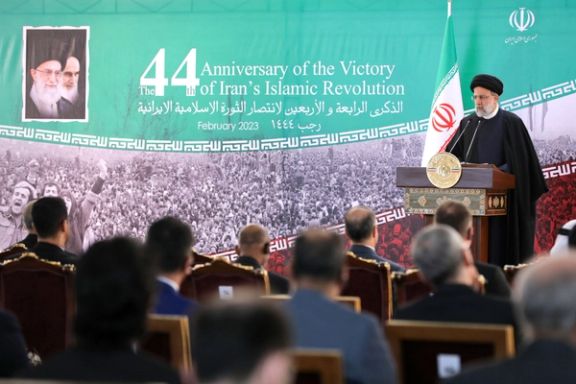
As the Islamic Republic is set for state-sponsored events for the 44th anniversary of its establishment on Saturday, European countries are calling for the boycott of the events.
In a statement on Thursday, members of several groups in the European Parliament and national parliaments called on European countries to boycott the ceremonies, and stand in solidarity with “the Iranian people who are fighting for their rights.”
Weeks before the anniversary of Islamic Republic’s establishment, a campaign was launched to boycott the regime’s ceremonies over the violent crackdown on nationwide protests sparked by the death in custody of Iranian Kurdish 22-year-old woman Mahsa Amini.
“We, cross-party Members of the European Parliament and Members of national parliaments, are urging the governments of the EU member states and the European External Action Service to boycott tomorrow's ceremony in Tehran for the anniversary of the Islamic revolution that brought this brutal regime to power. Likewise, EU officials ought to stay away from any such regime celebrations in Iranian embassies abroad,” read the statement.
The Islamic Republic government organizes 10 days of celebrations known as Fajr – literally meaning dawn – but the final day, February 11, is the most important one, in which the regime heavily invests. It already held an event on Thursday with a group of foreign ambassadors to the Islamic Republic with President Ebrahim Raisi in attendance. The government did not release the list of the participants but according to some reports envoys from European countries did not participate in the event – except for Hungary and Poland.
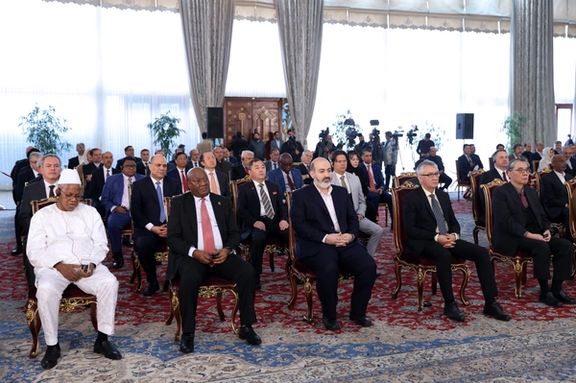
Dismayed by a lack of participation of Western envoys, Raisi said during the event that “The US and the three European countries [that are signatories to the 2015 nuclear deal] were caught up in a state of delusion and made miscalculations” by “meddling in Iran’s domestic affairs,” referring to the ongoing uprising.
Hailing the unanimity of European countries, US Senator Bob Menendez, Chairman of the Senate Foreign Relations Committee, tweeted, “Glad to see broad EU consensus against Islamic Revolution Day in Tehran, except from Orban’s Hungary, which all too regularly embraces autocrats, and Poland, whose silence is disappointing.”
“Nobody should be celebrating a regime with this much blood on its hands,” he added.
The statement by the MEPs added that “Over the past 44 years, the Islamic Republic has murdered tens of thousands of Iranians and has spread terror, misery and war throughout the region and beyond. Together with the Assad regime and Russia, the regime in Iran has carried out horrific war crimes in a conflict that has killed over 500,000 Syrians.”
The statement drew attention to the fact that hundreds of protesters have been killed, “for the 'crime' of demanding freedom, democracy and dignity and above all equal rights for women. Women and even young girls are being harassed, arrested, tortured, raped and murdered for simply refusing to wear the hijab or just for not fully covering their hair. At least 100 Iranians are facing the death penalty over their participation in protests following sham trials where the accused had just 15 minutes to defend themselves.”
Touching upon the growing military ties between Iran and Russia, the statement warned that “Tehran is now intensifying its growing alliance with Russia by supplying Moscow with Kamikaze drones designed to terrorize the Ukrainian people and to destroy their critical infrastructure.”
The MEPs said that celebrating “the rise to power of this odious regime” by European politicians and ambassadors -- even low-ranking diplomats -- would be “an inexcusable violation of our own values and a betrayal of the Iranian people as well as the regime's countless victims in the region and in Ukraine.
“Any official European participation in these celebrations would play into the hands of the Islamic Republic,” they said, adding that the mullahs would like nothing more than to demonstrate that despite their repression of the protests, it is "back to business as usual" with the EU.